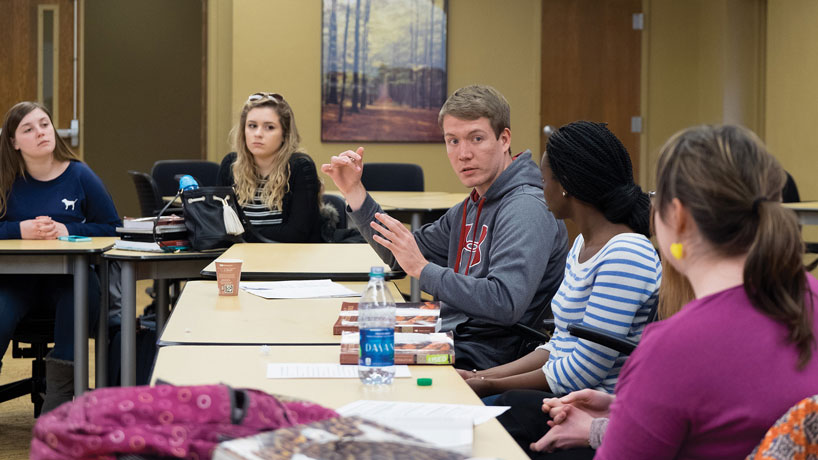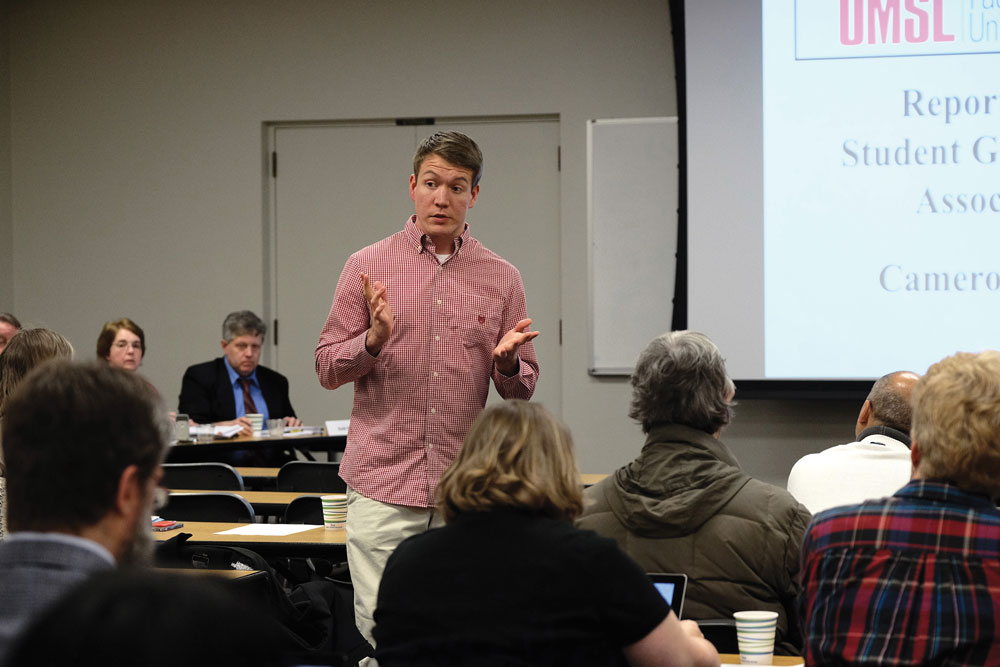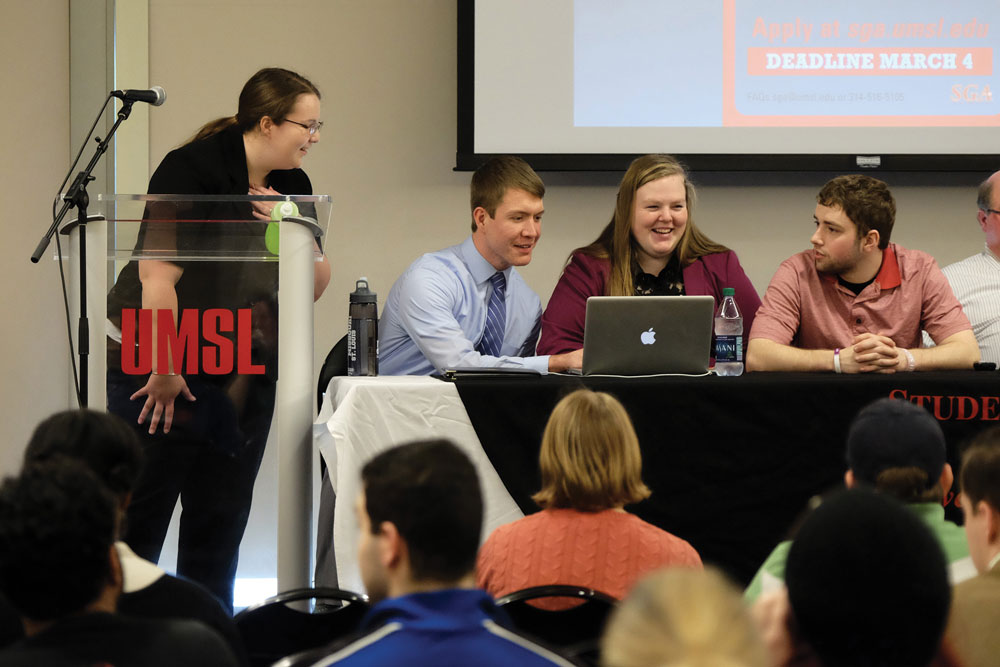
Recent graduate and two-time Student Government Association President Cameron Roark gives us a glimpse into his student experience and the opportunities open to those who choose UMSL. (Photos by August Jennewein)
A three-foot by four-foot window in a small office on the third floor of the Millennium Student Center at the University of Missouri–St. Louis looks out over campus. Green leaves. Falling leaves. Sunshine. Rain. And, often, stunning western sunsets.
For two years, the window has been symbolic of Cameron Roark’s view of UMSL.
He is a two-term president of the Student Government Association, criminology and criminal justice major, honors college mentor, student manager at the new Recreation and Wellness Center and frequent user of Dr. Seuss quotes.

At the Recreation and Wellness Center where he worked as a student manager, Cameron gets a run in on a second-floor treadmill overlooking the weightlifting area on the ground floor below.
And despite all that, Cameron feels “humbled” as he’s interviewed for UMSL Magazine. While eating a stir-fry dish from the Nosh, he says he considers himself a typical UMSL student.
So what’s typical?
Bright Lights, Big City
Cameron was born and raised in Jefferson City, the state’s capital situated in mid-Missouri along the banks of the Missouri River. The younger of Alan and Susan Roark’s two children, Cameron is a first generation college student.
“My parents were high school sweethearts who were married at 19,” he says, noting that they decided to stay put working and raising a family in Jefferson City.
Cameron considered his upbringing fairly idyllic, with a high school football injury the first notable setback, but also the impetus for setting a new course in his life. Instead of athletics, Cameron decided to focus on public affairs. His college search centered on finding a place that could nurture his new passion. He also sought a larger environment, a place with more diversity and opportunities.
Nearby St. Louis was an obvious option – UMSL not so much.
UMSL was an accident
Growing up, Cameron remembers watching the St. Louis Cardinals play at Busch Stadium and the animals roaming at the Saint Louis Zoo.
Saint Louis University was his first visit, but something just wasn’t right about the fit. So he turned to the Internet, where he found UMSL and was intrigued. A campus visit sealed the deal.
“The people I met just seemed to care,” Cameron says. “Now – just about four years later – it has been one of the best decisions of my life.”

As a prominent student leader, Cameron has become skilled at addressing university officials. Here, he presents to the University Assembly and Faculty Senate at UMSL.
Bonding at Oak Hall
Nervous and excited, Cameron started his college career in a new city on a fairly large campus. But he adapted early, he says, because of the friends he made in Oak Hall – the campus’s largest residential building.
“One of my most enjoyable experiences was living in the dorms during my freshman year,” Cameron says. “It was just a great time getting to socialize and make friends – friends that I still have today.”
Cameron rents a house in Florissant, Mo., with two UMSL alumni he met in Oak Hall – both now professionals in the criminal justice field. It’s a quick commute, and he loves being with people he trusts.
Not all of the people he met ended up housemates, obviously, but most have remained close and many became allies as he entered campus politics.
Running isn’t governing
Getting involved in UMSL’s Student Government Association was “natural,” Cameron says, for someone interested in politics and public policy. He ran for and was elected to the Student Government Senate – serving as the Senate chair as a sophomore.
The next natural progression was seeking the SGA presidency, which Cameron did with Oak Hall friends Deja Patrick and Dominic Margherio as his running mates for vice president and comptroller, respectively.
“Student government is what you make of it,” Cameron says. “If you put a lot into it, you’ll get a lot out of it.”
Cameron’s initial platform was to improve communication between students and administrators, increase student participation at events and make the SGA process more efficient. His second term has proven even more challenging, as well as more enlightening.

Cameron has a good time as he runs a Student Government Association meeting with his fellow officers.
This year, UMSL has faced the fallout of racial tensions on the Columbia campus and a budget shortfall of nearly $15 million on its own campus. Both issues pushed Cameron into hyper-drive, gauging student sentiments and working to ensure students were involved in the decision-making process.
“The protests at MU [in November] were very challenging from a governing perspective,” he says. “I learned that people want you to take sides. But we felt improving the future was more important than pointing fingers.”
Cameron met with student organizations to determine if the same issues expressed in Columbia existed at UMSL. He said that students did not give UMSL an A+, but felt the situations were different. Cameron credits in large part the staff of Student Affairs and Chancellor Tom George, who meet frequently with him and other students to address concerns.
The process to realign UMSL’s budget – a situation caused primarily by declining state support and flat or decreased student enrollment – has proven the most stressful for Cameron. He’s responded by advocating student concerns and setting up a forum to ensure students could speak directly to Chancellor George and other top administrators.
“Throughout the budget issues, I have learned so much,” Cameron says.
Among those lessons were that individuals with vested interests guard those interests and that the process moves slowly – especially for someone who describes himself as “impatient.” He’s also learned that there are limits to anyone’s power, including an SGA president.
“It took some time to realize I could not just make policies happen,” Cameron says, adding that he’s still developing his negotiation skills.
Taking advantage of opportunities
One of the contributing factors in choosing UMSL, Cameron says, was the Pierre Laclede Honors College, a small liberal arts college within the larger university that specializes in seminar-style, writing-intensive classes of 18 or fewer students.

Cameron speaks to students in Teaching Professor Kimberly Baldus’ Pierre Laclede Honors College class. He made frequent visits as an honors college mentor, one of his many roles during his time at UMSL.
As a mentor in the college, Cameron encourages students to become involved in campus organizations and to take advantage of internships – such as he did when working in the office of U.S. Rep. William Lacy Clay Jr.
“I found out there was a lot of bureaucracy-red tape [in government], and ways to get through it,” Cameron says. “I felt good resolving problems for people and realized that I was pretty good at it. They gave me more cases [to resolve] as time went along.”
Honors college students seem to appreciate Cameron’s insights and advice, as do the instructors.
“Individually, his most important message to students has been one of campus involvement,” says Kimberly Baldus, teaching professor in the honors college. “He’s passionate about how such opportunities to contribute to campus life benefit both the university and the students themselves.”
Moving forward
Four years and three UMSL elections later, Cameron is running fast toward spring commencement to receive his bachelor’s degree in criminology and criminal justice and minor in political science. He’s also finishing the acceptance process to study law at the University of Missouri–Kansas City in the fall.
It’s natural to think, given his history, that law is ultimately an avenue to elective office for him. But maybe not.
When asked, Cameron just smiles. And why not? His experiences and education provide him with lots of choices.
This story was originally published in the spring 2016 issue of UMSL Magazine.















